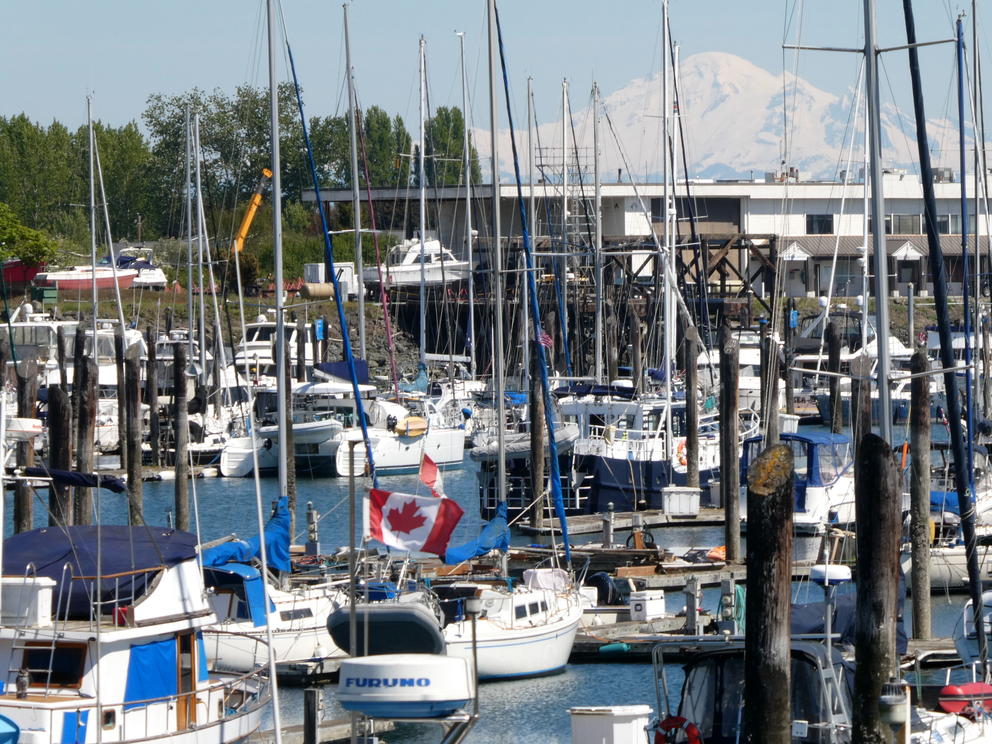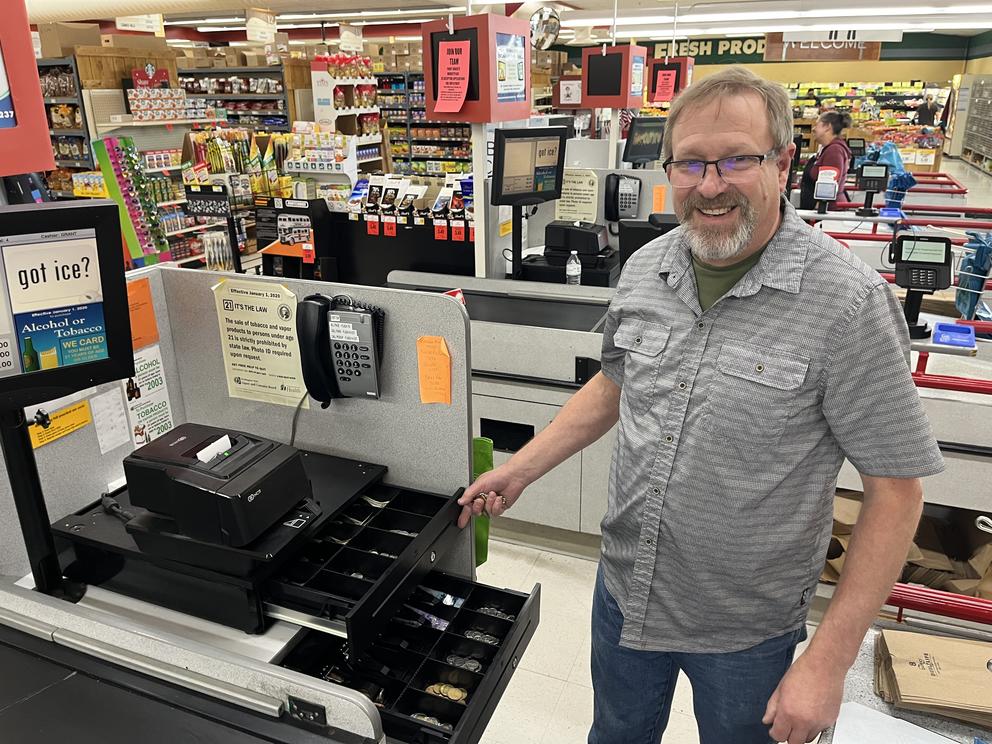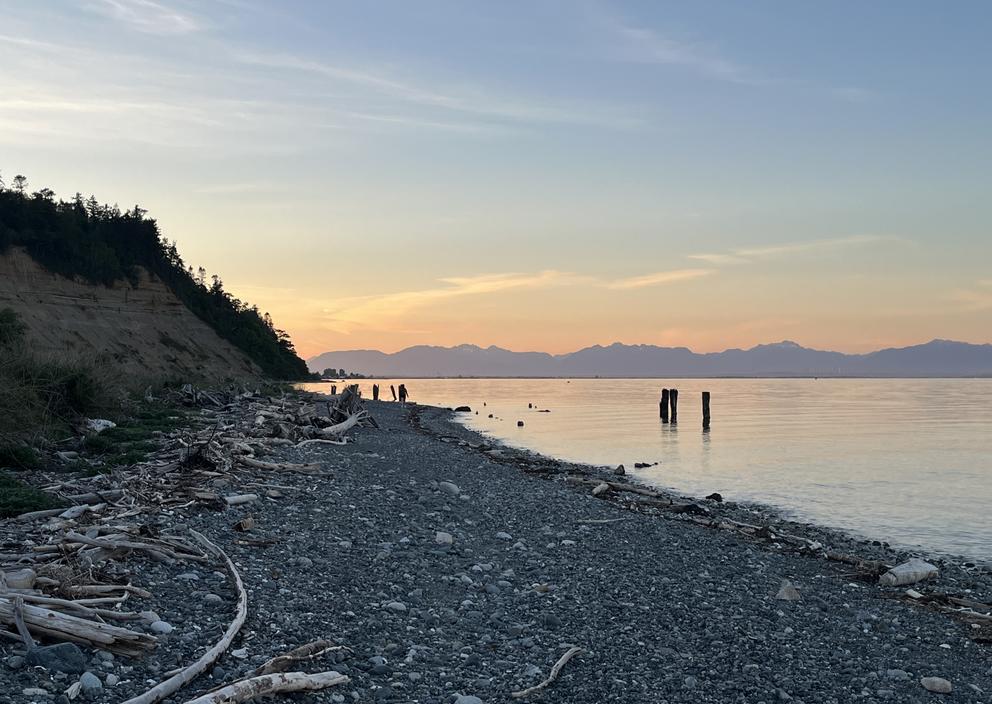The most recent inbound crossing data released for February and March of this year showed a bit of improvement over the same period last year, but the recovery, if that is what it is, is slow. The currency exchange rate, which can depress or spur cross-border shopping trips, is close to what it was in May 2019.
“Ninety percent of Point Roberts’ economy is Canadian-driven,” said local Chamber of Commerce President Brian Calder. “A significant number of them are finished with Point Roberts. They’ve made alternative plans and now we’ve broken their habit.”
Those attractive prices
For an unincorporated place surrounded by salt water on three sides and with only about 1,100 permanent residents, Point Roberts has an unusual profusion of gas stations and parcel pickup stores. These cater to Canadian day-trippers who duck across the border to buy cheaper gas, milk and alcohol and get free shipping on purchases from American e-commerce sites. Many beach houses are owned by British Columbians, and the Point Roberts marina serves the Metro Vancouver market too.
A visitor from the U.S. mainland might initially be startled by what seem to be 1970s-era gasoline prices at the petrol stations, until closer inspection reveals that fuel prices here are advertised in liters.
At the grocery store on the main drag, the registers have dual cash drawers to accept Canadian or U.S. money.
The Vancouver suburb of Tsawwassen presses right up against the boundary line, while the rest of Washington state is a 30- to 40-minute drive away through Canada via two international border crossings — unless you travel via private boat or plane.
Calder said the border hassles and geographical isolation from the U.S. mainland drove service workers to leave the five-square-mile peninsula during the pandemic lockdown, “and they’re not coming back.”
The Chamber of Commerce president commissioned jailhouse-orange T-shirts emblazoned with “Inmate” during the depths of the pandemic. Calder’s current customized Point Roberts T-shirt sends a message about the present business dilemmas with the slogan, “Forgotten … but not gone.”
The only grocery store, a closed golf course and a popular tavern
Ali Hayton owns the only supermarket in Point Roberts. Her business was so vital to the isolated exclave during the pandemic that Gov. Jay Inslee dipped into the state’s strategic reserves to help the store stay open in 2021. Hayton said her store’s hours continue to be limited today compared to pre-pandemic times because of reduced foot traffic and difficulty recruiting additional staff.
“It’s kind of a chicken and an egg thing,” Hayton said. “If we were open more, would more people come down? But if the border traffic is not there, it’s not worth continuing” to go back to the way it was.
People can’t rush down to buy a Washington Lotto or big Powerball jackpot ticket when the supermarket closes early, Hayton observed. She said Point Roberts used to have more things to do to draw people across the border. Reopening the golf course would be a good start.
Speaking of which, the privately owned 18-hole golf course received a cash injection from a new investor and is taking steps to reopen, according to course superintendent Rick Hoole.
“It’s a great golf course, you can’t beat that,” Hoole said, before adding a critical caveat. “But it’s Point Roberts. It’s very difficult right now.
“It’s just me and a trio of retired guys right now. We’re trying to find help.”
Hoole said in order to open this summer, his team will need to triple the existing skeleton staff. As they recruit, they are confronting the same labor shortages and extreme scarcity of rental housing that beset other Northwest destination getaways. Hoole said the owners of the rebranded Point Roberts Golf and Country Club are now considering supplying employee housing to attract new hires.
The longtime proprietor of Kiniski’s Reef Tavern similarly landed on the solution this year of packaging a summer job with employer-provided trailer housing after trying pretty much everything else, including appealing directly to his Congressman last year for foreign-worker visa leniency. Nick Kiniski said this might be his last summer at the helm, as he’s getting ready to retire and just listed his waterfront bar and restaurant for sale. He said he still believes Point Roberts has potential.
“I always thought it’s going to pop one day and go nuts,” Kiniski said in an interview. “It has gone up and down. But, I mean, 25 years ago I was offered more than I’ll get [now]. That’s kinda weird.”
Sitting on the establishment’s sunny, bustling patio overlooking the Strait of Georgia on a recent evening, he fondly remembered the business’ heyday decades ago when he had to hire scads of bouncers and off-duty sheriff’s deputies to control thousands of revelers who would cross the border on weekends to drink, dance, gamble and listen to bands.
“Obviously financially, I miss those times,” the extroverted bar owner said. “But I could not deal if you brought that business back, there’s no way. Where would I get 120 staff?”
Kiniski recalled that in the 1990s he could easily hire Canadian young people from the nearby suburbs of Tsawwassen, Delta and Ladner. An immigration clampdown that followed the 9/11 terrorist attacks in 2001 closed that door for border businesses.
“It’s a lot mellower,” Kiniski said on the cusp of this summer season. “I don’t need the 28 doormen and four sheriffs around anymore.”
“You can bitch about the border, but really, Point Roberts has been good to me. You know, it’s unique,” he reflected.
At the large, 900-slip Point Roberts marina, a cheerful sign reads, “Welcome back boaters.” A marina clerk estimated that 85% of the slips will be occupied by this summer, which represents a big rebound from the ghost-town depths of the pandemic when the majority-Canadian clientele could not come.
Enjoying the mellower pace
Some residents appreciated the quieter pace of life that the pandemic wrought in semi-rural Point Roberts and don’t want to return to the go-go border flows of pre-pandemic times. The community includes a higher-than-average percentage of retirees. The pushback to business boosterism is not organized, nor does it have a prominent spokesperson. But the sentiment emerged strongly in a recent project to collect COVID-19 stories from border communities led by Border Policy Research Institute postdoctoral fellow Andréanne Bissonnette.
“Not having thousands of people cross each week for their cheap fuel or parcels was actually a blessing. Peace and quiet here was wonderful,” said a Point Roberts small-business operator who contributed a comment that was anonymized in the forthcoming research report.
“I enjoyed the quiet in Point Roberts and observing the birds, coyotes and other wildlife thriving,” said a parent with children who were allowed to roam more freely. “It is amazing what a benefit the border closure was to the population of birds in my yard.”
Short and longer-term economic development
Some aspects of the local economy, notably real estate, held up during the pandemic and are still going steady. Next, several upcoming infrastructure initiatives could lay the groundwork for denser development or new businesses.
A nearly $12 million federal broadband grant awarded to Whidbey Telecom included funding to build an undersea fiber cable between Point Roberts and Whidbey Island. That promises to offer higher-speed and higher-capacity internet service in a few years to the peninsula where broadband speeds currently can be sluggish.
Another major project, merely under discussion at this point, would stretch a sewer line across the border from the city of Delta, British Columbia, into Point Roberts. Septic systems are de rigueur for buildings in Point Roberts, but that limits future development options and has environmental drawbacks.
Indefatigable Point Roberts Chamber President Calder continues to promote the idea of a blanket exemption or temporary nonimmigrant work (H-2B) visa that would allow local businesses to hire Canadians for seasonal service jobs. Last summer, Calder and several of the community’s bigger employers got the attention of U.S. Rep. Rick Larsen and Sen. Patty Murray.
“Point Roberts faces unique hurdles given its geography when it comes to recruiting workers, and I support common-sense efforts to help folks in Point Roberts more easily hire people from just across the border in Canada to keep their businesses afloat,” Murray said in a statement last week.
Murray’s staff previously made inquiries with the Department of Homeland Security on behalf of Point Roberts constituents. The upshot was that local businesses were encouraged to apply individually to the H-2B program, which allows qualifying employers to hire temporary foreign workers for nonagricultural jobs.
Supermarket owner Hayton prepared an H-2B visa application, but was unsuccessful and found the whole process befuddling.
“It just kept being kicked back by Homeland Security for one thing or another. After 10 hours, I gave up,” Hayton said.
Salish Current originally published this story May 20, 2024.






